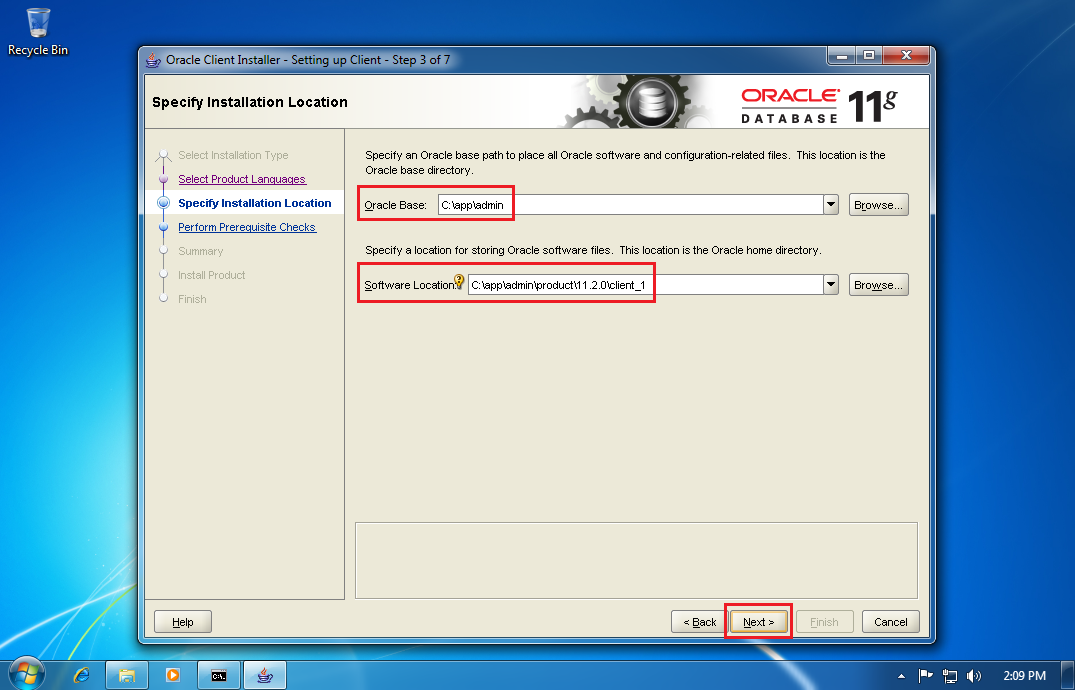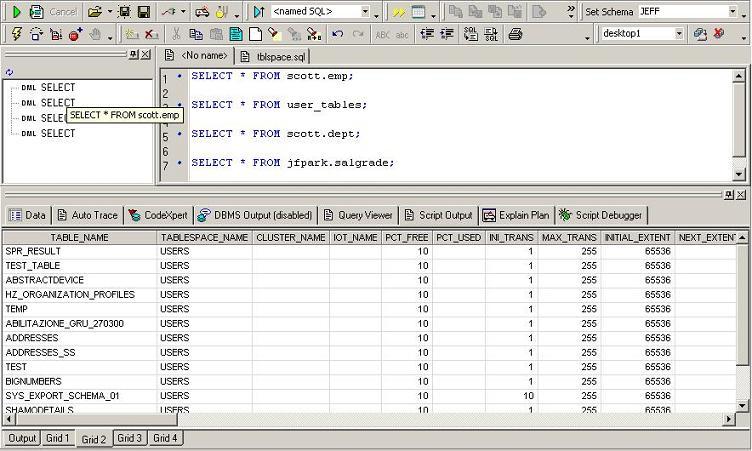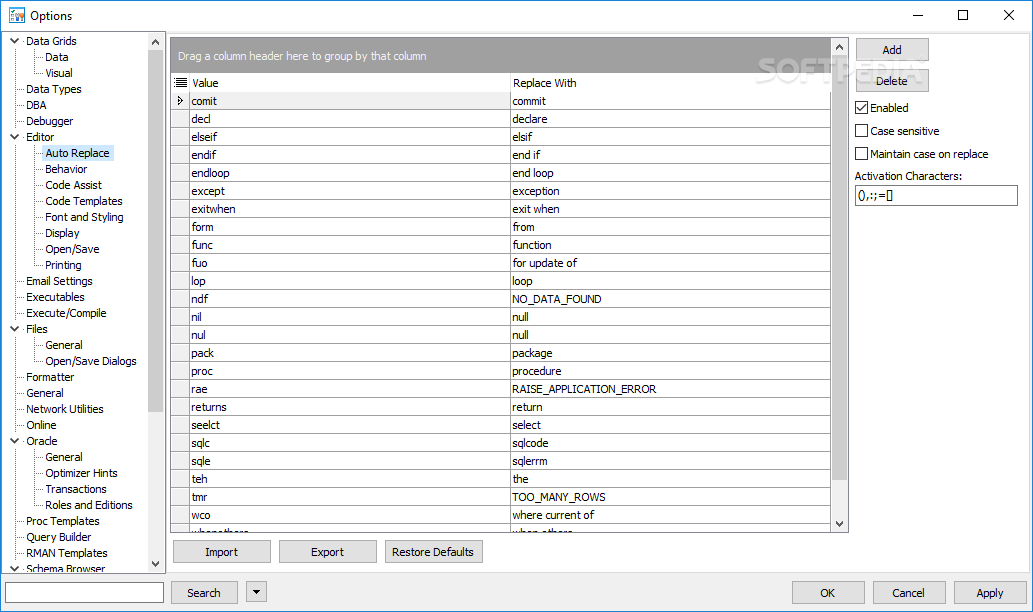Toad For Oracle Versions
First, you'll need to download the .msi (Special Installation Only) from Quest.com. If your Oracle client is 32-bit download the 32-bit version, else download the 64-bit.
- Oracle versions 8.0.6; 8.1.7; 9i; 9iR2; 10gR1; 10gR2; 11gR1, 11gR2 Note: It is recommended that your client version be of the same release (or higher) as your database version. In addition, to take advantage of Toad for Oracle's new Unicode support, you must be working with Oracle client/server 9i or above.
- Toad supports importing settings from previous versions only if the previous version is 2 or less releases ago. John 'it's full of stars!' Bowman replied: If they have pre-installed Toad 10, but not run it yet, you will automatically be prompted to copy your user files from a previous version.

800MB — Toad for Oracle Base Edition 1GB — Toad Developer Edition for Oracle; 530MB — Toad for Oracle Professional Edition 2GB — Toad DBA Edition for Oracle 625MB — Toad for Oracle Xpert Edition; 2GB — Toad DBA Edition for Oracle RAC and Exadata Editions.
Retrieve the license .xml file
Toad For Oracle Versions
- Install manually the .msi
- Launch the application and register the license key (Site message, License key)
- Close the application, copy the file ProductLicenses.xml from this folder:
*Put the .xml file with your .msi file.


Create an .MST file

With the help of an .msi file editor as Orca, InstEd, etc. In this example we'll use Orca.
- Right-click on the .msi file, choose Edit with Orca
- In the top menu, choose Transform -> New Transform...
- In the Directory Table, create a new Row for the Common AppData (C:ProgramData);
- Directory:CommonAppDataFolder
- Directory_Parent:TARGETDIR
- DefaultDir:.
- Still in the Directory Table, create a new Row for licenses directory (C:Programdata{08439167-4CA5-48E9-A810-A3A7C0B80B06});
- Directory:DirProductLicenses
- Directory_Parent:CommonAppDataFolder
- DefaultDir:{08439167-4CA5-48E9-A810-A3A7C0B80B06}
- Move to the File Table, add a new Row for the ProductLicenses.xml;
- File: ProductLicenses.xml
- Component_: ProductLicenses.xml
- FileName: ProductLicenses.xml
- FileSize:314 (from the file properties)
- Attributes:8192
- Sequence:595 (Increment the last existing sequence number)
- In the Component Table add the following row;
- Component:ProductLicenses.xml
- ComponentId:{01A64F7E-2CCC-4E44-95B9-D9F2DB1D4F06} (Use one generated from a GUID generator like https://guidgenerator.com/, the GUID must be UPPERCASE)
- Directory_:DirProductLicenses
- Attributes:0
- KeyPath: ProductLicenses.xml
- In the FeatureComponents Table, add the following row;
- Feature: Toad_Full_Install
- Component: ProductLicenses.xml
- In the Media Table, add the following row;
- DiskId:3 (Increment the highest existing value in the Media Table)
- LastSequence: 595 (use the same value as the added value in the File Table)
- DiskPrompt:LABEL
- In the top menu, choose Transform -> Generate Transform... (Save in the same folder as the .msi file and .xml).
Now you should be able to deploy the application with a valid license with your favourite deployment software:
Toad For Oracle Older Versions
| Home E-mail Us Oracle Articles New Oracle Articles
|
Advanced Oracle Utilities: The Definitive Reference by Rampant TechPress is written by top Oracle database experts (Bert Scalzo, Donald Burleson, and Steve Callan). The following is an excerpt from the book. Toad for Oracle vs SQL DeveloperIt may seem odd here to list a tool from a third party vendor, but since Oracle was late to the game with SQL Developer, many people standardized on a tool from Quest Software called Toad. The letters in Toad originally stood for Tool for Oracle Application Developers. It started as a one-man effort on Compuserve, and then moved to the web at www.toadsoft.com. Later, it was acquired by Quest Software and legitimatized into a full blown, world class commercial product. However, even today, a competent and popular freeware version remains. With well over a million users worldwide, it only seemed logical to include mention of Toad here, especially since the lag time by Oracle to offer a graphical SQL tool essentially created both this market and tool. Toad is a Microsoft Windows-only GUI for doing all things Oracle. In many respects, it was simply a precursor to Oracle's own SQL Developer, but ten years earlier. Toad has one very distinguishing trademark: the tabbed interface. While it can also display items via a tree-view or drop-down list, the early acceptance and adoption of the new-style tabbed interface was critical in its success. For many, the interface just felt right. In fact, look back again at Figure 5.3 of SQL Developer and notice how the right hand sides of the screen are similar. The major differences in the author's arguably biased opinion between Quest's Toad and Oracle's SQL Developer products, besides price, are highly summarized in Table 5.1 using a rating scale of 1 to 5, where 1 is the lowest and 5 is the highest. However, be aware that both tools are quite good and make most people much more productive, so in the end it often comes down to a personal choice more than anything else. Unlike products such as Microsoft Office, which seem to become the overwhelming single standard, it is quite possible to envision most companies having both products in everyday use due to both budgetary reasons and personal productivity preferences. Thus, it probably will not be one product entirely or the other for most companies.
Table 5.1: Toad vs. SQL Developer Oracle's Enterprise Manager is really the DBA's tool, so to keep markets and messaging clear, there is minimal overlap with most DBA features in OEM only. SQL Developer works only with more recent versions of Oracle and only offers support for versions 9.2.01 and higher, whereas Toad supports Oracle versions from 7.x on up. Toad has been successfully run by some users via the Windows emulation package (WINE) on Linux and other platforms, but Quest does not fully support this. Quest offers a multi-database platform version of Toad as a different product that looks and feels like Toad, but works natively with numerous databases and supports working with any database that supports the ODBC 3.0 API specification. A very promising future here, but enough companies have not yet begun to offer products and some that have offered add-on products have also been acquired by Oracle. |
